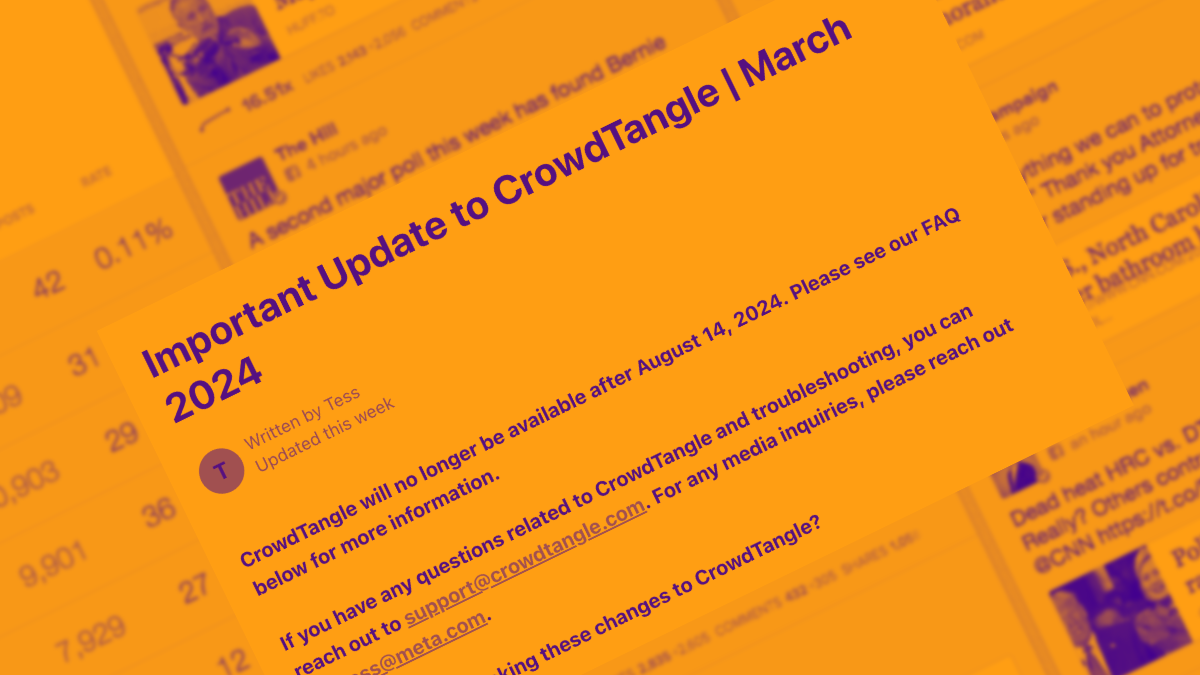Why the Loss of CrowdTangle Signals Trouble for Civic Tech Products
Mark Belinsky / Aug 23, 2024
In March 2024, Meta announced it would shutter CrowdTangle on August 14, 2024.
Last week, Meta quietly shut down CrowdTangle, the last tool that provided meaningful access to data flows on the Facebook, Instagram, and Reddit platforms. For those working on election integrity and civil rights in the digital age, this is a seismic event. The implications, particularly in a year packed with elections around the globe, are far-reaching and troubling.
Without access to essential tools and data for civic tech, digital democracy is eroding. At a time when we need more products to empower the public, not fewer, this limitation is especially concerning. It’s a stark reminder that in civic tech product development, the ability to adapt and evolve is crucial, especially as platforms and data sources change or disappear.
CrowdTangle wasn’t just another piece of software; it was the backbone of many election integrity efforts. For example, it was a core component of iVerify, a tool my team developed at the United Nations Development Program (UNDP). iVerify used CrowdTangle’s API to monitor and analyze the spread of disinformation across social media in real-time, helping detect emerging false narratives before they could gain traction.
Now, without CrowdTangle, these tools are hamstrung. The ability to track misinformation—to see how it moves, who it reaches, and how it’s engaged with—is severely diminished. For those of us in the business of protecting the integrity of elections, this isn’t just a technical inconvenience; it’s a real-world problem with potentially severe consequences. Voters are left vulnerable to the unchecked spread of falsehoods. In regions where political stability is fragile, the absence of these tools could mean the difference between a peaceful election and one marred by violence.
When we built iVerify, we approached the project with a human-centered design philosophy, focusing on the needs of election officials, civil society organizations, and voters. iVerify is fully open-source, hosted on GitHub, and includes comprehensive documentation—ensuring transparency and adaptability.
iVerify was constructed with several key components:
- CrowdTangle API: Essential for monitoring social media platforms.
- Meedan’s Human-in-the-Loop AI: Ensuring critical decisions captured context and nuance.
- WhatsApp API Integration: Crucial for communication in developing countries.
- WordPress Integration: Making the information widely accessible to citizens.
- Detoxify & Jigsaw API Integration: Adding layers of real-time detection of harmful content.
- Global Deployments: Used in countries like Zambia, Honduras, Kenya, and Sierra Leone.
But with CrowdTangle gone, maintaining, improving and growing these features has become a significant challenge. iVerify is more than just a tool; it’s a digital public good—a resource that benefits society as a whole. Its open-source nature and global deployment make it crucial in the fight against disinformation, but its effectiveness is now under threat.
Moreover, iVerify revealed critical gaps in existing debunking efforts, particularly in areas like tracking disinformation in ads and under-monitored channels such as radio and print media. We also need stronger tools for real-time video content analysis, transparency around political ad removals, and better legal compliance mechanisms. The potential of generative AI for contextual analysis and on-device scanning for misinformation warnings are still largely untapped. These areas highlight the urgent need for more civic tech products, not fewer, to effectively counter false narratives and protect democratic processes in a rapidly evolving digital environment.
iVerify is just one example of the harms caused by Meta's calculated shutdown of CrowdTangle, a decision that ignored recommendations from academics, researchers, and human rights experts. This move cripples civic tech tools vital for monitoring disinformation and protecting democratic processes. By removing a key layer of transparency, Meta has made the public more vulnerable to manipulation at a time when robust oversight is crucial.
The shutdown of CrowdTangle is reminiscent of darker chapters in the recent history of social media, like Facebook’s role in the violence against the Rohingya in Myanmar. CrowdTangle was one of the few tools that allowed civil society and researchers to see harmful dynamics in real-time. Its shutdown, especially in an election year, feels like a step backward, especially when Facebook previously admitted it hadn’t done enough to prevent its platform from being used to incite offline violence.
The loss of CrowdTangle highlights a critical gap in the technical infrastructure needed to support civic tech efforts in combating disinformation. To fill this void, tech companies must step up to provide robust infrastructure that includes comprehensive API access, transparency mechanisms, and long-term support. Here’s how these elements would be applied:
1. Comprehensive API Access: Companies need to offer APIs that allow detailed and real-time access to data across various media formats. For instance, tools like iVerify relied heavily on the CrowdTangle API to track disinformation on social media. New APIs should provide similar or better access, enabling civic tech products to monitor disinformation across ads, media content, and video platforms. This includes essential metadata such as video descriptions, tags, subtitles, targeting information, and engagement metrics.
2. Transparency and Compliance Mechanisms: Civic tech products must integrate with transparent content filtering and ad removal mechanisms. iVerify’s ability to monitor disinformation could be significantly enhanced by tracking and analyzing ads across platforms, providing transparency about their content, sources, and targeting. Maintaining comprehensive databases with detailed logs on ad removals and compliance reporting would ensure trust in the moderation process. Moreover, government support is needed to digitize and provide transparent access to national laws, facilitating legal compliance checks by civic tech products.
3. Content Filtering and Analysis: Companies need to develop content filtering mechanisms that balance free speech with the need to prevent harm. These mechanisms should be transparent, allowing civic tech products like iVerify to integrate and understand the rationale behind content filtering decisions. Additionally, there’s a pressing need for tools that can monitor, analyze, and flag misleading or false information in video formats, given the increasing popularity of video content platforms.
4. Consumer Edge Computing: Companies like Apple and Google should develop APIs supporting edge computing capabilities, allowing content to be analyzed directly on user devices. This includes federated learning frameworks that enable decentralized, privacy-preserving machine learning models to operate in real-time. This approach offers immediate feedback and warnings about potential misinformation, providing users with immediate, context-aware guidance on the information they encounter.
5. Long-Term Support and Data Interoperability: There must be a commitment to maintaining and evolving API ecosystems, ensuring they remain functional and relevant as the digital landscape changes. Establishing standards for data portability and interoperability is crucial, allowing seamless integration and data sharing across various civic tech platforms. This interoperability enhances the collective effectiveness of tools like iVerify in combating disinformation.
6. Public-Private Partnerships and Collaborations: Effective civic tech development requires strong public-private partnerships. Companies should actively engage in collaborations such as hackathons, joint research initiatives, and open-source projects. These collaborations can foster innovation, allowing civic tech products to leverage the strengths of both the public and private sectors to create more robust solutions to combat disinformation.
These infrastructure components are not just nice-to-haves—they’re essential for ensuring that civic tech products like iVerify can continue to protect democratic processes in an increasingly complex digital environment. Without them, the ability to safeguard elections and counter disinformation is severely compromised.
There’s still hope. Europe’s Digital Services Act (DSA), passed last year, is designed to bring greater transparency to the online world. A key component, sometimes referred to as the “CrowdTangle provision,” mandates real-time access to public data. While Meta’s attempt to replace CrowdTangle with the Meta Content Library is not an adequate solution, the DSA could help restore some lost capabilities and serve as a model for other regions.
Greater coordination across sectors is needed to ensure national and international policies mandate pathways for civic tech products, similar to DSA Article 40.12, with strong enforcement. This benefits everyone: citizens get reliable tools to protect democracy, and tech companies gain a clear regulatory framework that builds trust and stability, enhancing their reputation and reducing backlash.
CrowdTangle’s shuttering is part of a broader backslide in the tech industry, marred by layoffs ravaging trust and safety teams, policy rollbacks, and noncompliance with various mandated guardrails and regulations.
The killing off of CrowdTangle is a stark reminder of the challenges we face in the digital age. It’s not just a technical loss; it’s a blow to the digital public infrastructure that supports election integrity and digital civil rights worldwide. For civic tech product development to succeed, policies must be built in tandem with code to ensure that the humans at the center of the design truly benefit. Otherwise, these tools can only be as effective as the broader ecosystem allows.
The future of informed and democratic elections may well depend on platform’s willingness to embrace openness and collaboration.
Authors
